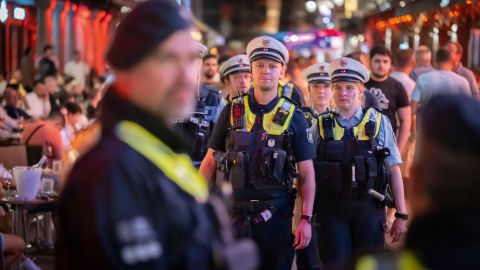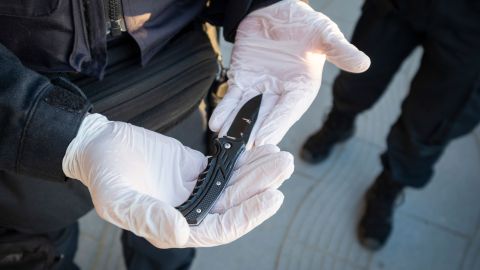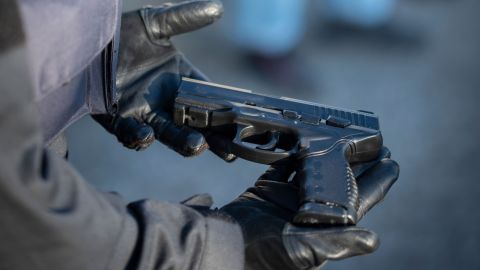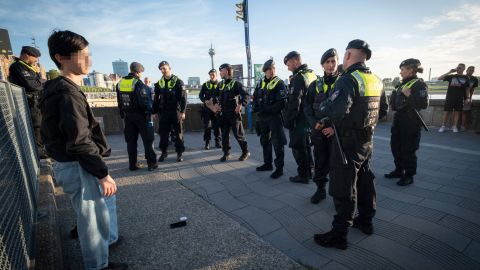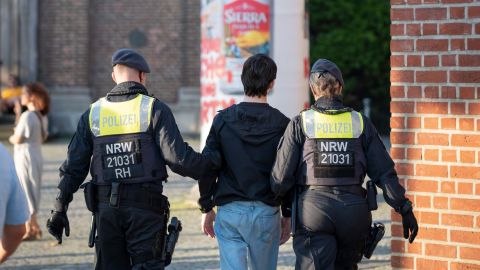An evening in Düsseldorf. "No, he's fine," police inspector Kilian Böing reassures the agitated woman on her cell phone. Böing is standing on the Rhine promenade in Düsseldorf - in front of him a group of boys who are playing it cool - and is on the phone to Yassim's mother. He has just been caught with a pocket knife. In the middle of the weapons ban zone. Blades over 4 centimetres long have been taboo here since the end of 2021 and the police have been deploying large numbers to check. This is a reaction to the knife attacks that have unsettled the citizens of the city in recent years.
In August, Minister of the Interior Herbert Reul presented the situation report "Violence in public spaces - knife crime in North Rhine-Westphalia 2019 to 2023". A concept to combat knife violence was also presented. In the situation report, the State Criminal Police Office of North Rhine-Westphalia extensively analyzed knife crimes in recent years. The investigation focused on perpetrators, crimes, crime scenes and victims. Acts that occurred on public streets, in party hotspots or in restaurants were evaluated. Around 3,500 crimes were committed with knives in 2023.
Interior Minister Herbert Reul: "It's the person holding the knife that turns it into a weapon. We need to learn more about perpetrators, crimes and victims if we want to prevent these terrible knife attacks. The analysis tells us that knife violence is young and male."
It is 8.40 p.m., the setting sun bathes the banks of the Rhine in the warmest summer tones. Couples are strolling. Soccer fans parade through the old town singing. The bar tables in front of the pubs are packed. It's the weekend. Düsseldorf is celebrating. And in the middle of it all, wherever you look: Police. On foot, in groups of four, with police cars. Showing presence. Checks. Searching jackets, trouser pockets and shoulder bags. They confiscate weapons, issue warnings and send people away. The Wuppertal riot police started their duties at 7 p.m. with a platoon of 38 people and positioned themselves at the main entrances to the old town. The men and women know their job and know what to do. And after so many deployments here, they have long since gotten to know their clientele and know who they should be checking out. "I've noticed a certain brutalization. Perhaps through social media or music that glorifies violence. And there is often a lack of awareness of what is wrong," says Platoon Leader Stefan Helming, a 42-year-old police chief inspector.
From 2022 to 2023 alone, the number of knife attacks in public spaces in North Rhine-Westphalia increased by 42.6%, from 2,479 to 3,536 cases. The perpetrators are almost exclusively men, half of them under the age of 21 and 45% do not have German citizenship. The gun ban zones that were set up in Cologne and Düsseldorf as a result soon began to bear fruit. In the first year alone, the police seized 349 weapons and knives during 17,191 checks. In 2023, 40,000 people were checked, 500 bans were issued and 50 people were taken into custody for carrying knives and weapons. The following were found: Butterfly knives, daggers as well as one-handed, switchblade and pocket knives, but also telescopic batons, manslayers and alarm guns, irritant and signal weapons.
Interior Minister Herbert Reul sums up: "If anyone has ever wondered whether weapons ban zones contribute to the safety of our inner cities, then this arsenal is the impressive answer." In North Rhine-Westphalia, the police have consistently had good experiences with such zones and intensive controls.
He is just 14 years old, the boy standing on the edge of Burgplatz in jeans, a black T-shirt and dark blouson. Loosely surrounded by five or six police officers. His gaze is lowered, he looks insecure and at the same time a little defiant. The officers have just discovered what is known as a make-believe weapon on him, stowed at an angle in his waistband. The weapon looks deceptively real, but it's not. "It's broken, you can't open it," explains one of the officers. "He says he took it with him for his own protection!" After a phone call with the boy's parents, he is led by two police officers towards the Old Town police station. His parents will pick him up.
The police can impose a fine of up to 10,000 euros for a violation within the weapons ban zone. In most cases, it is 500 euros, in the event of a repeat offense and for serious offenses up to 10,000 euros. "Everyone should see: The police are present and active. The more word gets around, the better the deterrent effect," says 33-year-old Tobias Roy, who has been on duty at the Altstadt-Wache for seven years. He doesn't just see it that way as a police officer, but also as a citizen: "We also go out partying with friends and want to feel safe!" On this Saturday evening, he is on duty with his colleague Nadine Bertlings, a 27-year-old police superintendent. As is so often the case on these missions, they will be out and about in a group of four. On the lookout for situations that appear difficult and could potentially escalate. They will be on the lookout for arguing bar patrons, bouncers, aggressive junkies, young people in groups who are looking for a little adventure, a kick.
"It's important that there are four of us on the road," explains Nadine Bertlings. "Two of us approach people and take action, while the other two stay in the background and concentrate on what's going on around them. What is going on behind colleagues' backs? Is a conflict situation possibly escalating?" It's not always about problems, sometimes they are simply asked for directions. Sometimes they are called because someone is helpless and needs their support. And sometimes people are just grateful that the police are there and want to tell the officers that. Often enough, they act as mediators. When people have had too much to drink, when two people get into a fight over something trivial. "Then we intervene before someone gets involved in the situation. In the end, we actually say: "Shake hands now." A lot of people need that," says Tobias Roy.
On the first floor of the Old Town police station, police superintendent Carolin Hollenhorst sits in front of a screen that serves her images and scenes from the Old Town as if on a platter. 14 video cameras are installed at neuralgic points. They are so precise that you can even read the restaurant menus on the screen. With the help of video surveillance, escalating situations can be identified more quickly and officers can be called to the hotspot by radio from the station. In general, this station is focused on making nightlife in Düsseldorf safer. For example, the lights on the Rhine promenade or Burgplatz can be raised from here to improve the sense of security among night owls or to brighten up neuralgic spots so that they become unattractive for potential criminals.
"We are receiving feedback from landlords and citizens that they feel safer again in the old town thanks to the police presence," says Ingo Dudenhausen, head of department at the Ministry of the Interior.
The Ministry of the Interior has been working on concepts for some time to get a better handle on the issue. Among other things, they are considering an intensive offender concept that includes measures ranging from low-threshold interrogations and driving license revocations to a complete ban on weapons.
Dudenhausen: "Anyone who comes from Syria or Afghanistan and has experienced bad things should be told: You don't need a knife here. Not with us. But of course there are also the tough offenders who are examined to see which measures are most effective. We don't want to dictate that here in Düsseldorf. There is no one right solution to knife violence. Different measures have to work together."
Night has long since fallen over Düsseldorf's old town on this Saturday. When the outdoor restaurants close and the strollers go home, "the special flair of the old town has disappeared", says Stefan Helming, head of the Wuppertal police squad. At six o'clock in the morning - as always - the units' duty ends. The end of the night. One without any major incidents.
